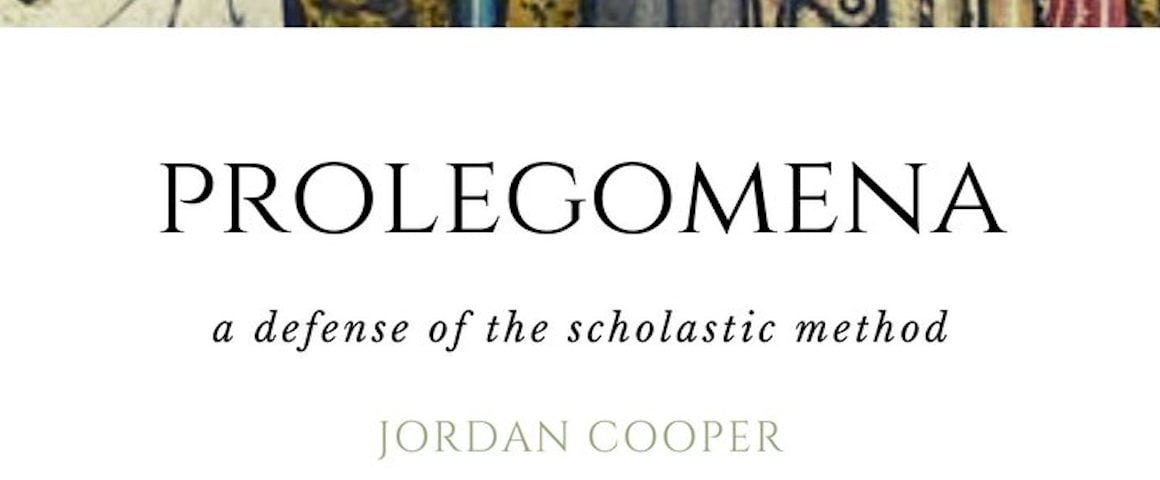Prolegomena: A Defense of the Scholastic Method. By Jordan Cooper. A Contemporary Protestant Scholastic Theology. The Weidner Institute: A Division of Just and Sinner, 2020. 358 pp. $21.60 (paperback)
Whether you realize it or not, a heated debate has been taking place in Protestant circles these past few decades, over the usefulness or even compatibility of the “scholastic” method of theology with reformational principles. Dr. Jordan Cooper sets out to correct these perceived philosophical missteps in modern theology in the recently published, A Contemporary Protestant Scholastic Theology: Prolegomena.
If you’re not altogether familiar with this inter-protestant (and especially inter-Lutheran) debate over the usefulness of philosophical categories for doing theology, specifically the ideas and methods of Aristotle, do not worry. Dr. Cooper has written this volume to include both an introduction to the conflict at hand, as well as a resounding judgment of the “radical Lutheran” contingent, and a long-overdue vindication of the oft-neglected scholastic writers found primarily in the 17th century period of “Lutheran orthodoxy.”
Dr. Cooper admits his indebtedness for this work to two major defenders of 17th-century protestant scholasticism, the Lutheran scholar Robert Preus and Reformed scholar Richard Muller. These contemporary defenders of protestant scholasticism are contrasted with leading writers in the “radical Lutheran” school who favor a more existentialist approach to theology. Theologians like Gerhard Forde (who coined the term “radical Lutheran”), Oswald Bayer, and Steven Paulsen, are identified as representative thinkers of the existentialist school, explicitly rejecting the clarity of scholastic definitions in favor of theories of “action” especially speech acts.
Cooper does an excellent job of spelling out what exactly is at stake in these theological disagreements, both by summing up some of the more disturbing doctrines of the radical school and by laying out the benefits of a recovery of Protestant scholasticism for the modern church. Forde famously holds that “the law” can only be seen in a negative light, as opposed to the traditional view of the law as eternally emanating from God’s very being. In Forde’s thought this leads to a view that denies the atonement itself. Cooper spells all these issues out nicely in the first part of the book, but it is not a purely polemical work. The second half of the book contains Cooper’s positive defense of the scholastic method as useful for Protestant theology, and ultimately as a help for resisting the errors that modern philosophy imports.
One particular point that is valuable to all Protestants is a refutation of the claim that through Luther the ideas of Ockham were given a new lease on life among the Protestants. This narrative, being a continuation of a dated Anglo-Catholic reading of history with a new spin from thinkers associated with Radical Orthodoxy, has now become a bludgeon of Roman Catholic and other traditional polemicists to “blame the Reformation” for every modern ill. Cooper addresses these claims thoroughly, examines their history, and pokes giant holes in the many assumptions they make. Contrary to a popular myth, Cooper suggests, the ideas and methods of Plato, Aristotle (and even Aquinas) have their place in Luther’s thought and played a formative role on the dogmatic theologians that carried on his tradition.
The Christian who, like Tertullian, asks “What hath Athens to do with Jerusalem?” is not likely to be won over by this book. Modern thinkers like N.T. Wright have made great strides in biblical scholarship, and have often maligned scholastic (and Reformational) theology as distractions from the “real work” of understanding the scriptures in a purely (second temple) Jewish frame. Oddly enough, Wright himself has been known to “pillage the Egyptians” when he wrote one of the best short guides to Aristotelian virtue ethics for the Christian layman in recent times. Perhaps this simply goes to show that the master is frequently more interesting than his students.
For the convinced, or even the open-minded Christian belonging to a reformational Church (like the Anglican one) Cooper’s work will open up a world of 17th-century riches, and perhaps reaffirm the Catholicity of the Reformation anew. For Anglicans in particular, whether one sees our tradition as a via media between Rome and the Reformation, or rather a via media between Wittenberg and Geneva (or Zürich as the case may be), it seems we Anglicans have good reason to pay close attention to our Lutheran cousins, especially when they speak so clearly and in favor of a Reformed Catholicism.







'Review – Prolegomena: A Defense of the Scholastic Method by Jordan Cooper' has no comments
Be the first to comment this post!